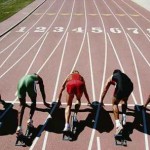 Stress and performance anxiety is a part of everyday life for athletes. The good news is that not all stress is bad stress. In the right amount, stress helps you focus better and achieve what you want. Stress can help athletes be more alert, motivated, and gain a competitive edge. But too much anxiety, non-stop stress is debilitating to an athlete’s health and performance.
Stress and performance anxiety is a part of everyday life for athletes. The good news is that not all stress is bad stress. In the right amount, stress helps you focus better and achieve what you want. Stress can help athletes be more alert, motivated, and gain a competitive edge. But too much anxiety, non-stop stress is debilitating to an athlete’s health and performance.
If you experience too much anxiety, your performance suffers because it makes you physically tense and cripples the ability to focus. Some athletes feel this when afraid to lose, get embarrassed, or afraid of injury. Once you experience anxious jitters, you become obsessed with the uncomfortable feelings, which distract you from what you need to focus on.
The first step minimizing your anxiety is to address your fears. Put your fears aside and focus on something more pleasant. Keep your mind distracted from the anxious thoughts about losing and focus on your preparation for the match. Visualize yourself performing the way you do in training.
Second, you need to accept that nerves are part of sports. Interpret them as a way of getting you focused for the opening round and giving you the shot of adrenaline you need. This is how great athletes perceive nerves. Focusing too much on the uncomfortable feelings only heightens the tension. Shift your attention to your game plan and your strategy for the opening minutes.
You could also try some simple relaxation exercises before games. Take a few deep breaths through the abdominal region. As you inhale, shrug your shoulders to your ears. As you exhale, drop your shoulders and release the tension. Tighten and release your grip to prevent the death grip. You want to release the tension in your hands, arms, and shoulders before you begin the match.
Lastly, focus on execution. Ask yourself, “What do I need to do to perform my best right now?” The answer will provide you with the appropriate task-relevant cues. See your plan you want to execute and feel a positive outcome. Do not rush prior to competition, which is a natural response to worry and anxiety. Pace yourself before competition and use this time to help you prepare mentally. Make sure your mind is focused on the present and not on outcome or others who are watching.


























Everyone gets a little nervous before a game or athletic event. To decrease the anxiety and improve your performance, do visualization work means close your eyes and imagine the things that you make in order to be successful and the most necessary thing is to develop the self-confidence. Relaxation will help us to reduce the physical symptoms of anxiety so practice the night or in hours preceding an event.
This article is essentially describing how to use the law of attraction. In short this article can be summed up as this, imagine yourself doing great and everything going great and you will feel good and when you feel good you feel relaxed which will help lead to you succeeding. Feel good, believe in yourself, and distract yourself from the negatives by focusing on the positives…ie, use the law of attraction to get the results you seek. If all the athletes did this, they would all have a great close game/event/race and would all be proud of how it turned out win, lose, or draw. The one with the most positive momentum on their side will win, but all will have a great time!